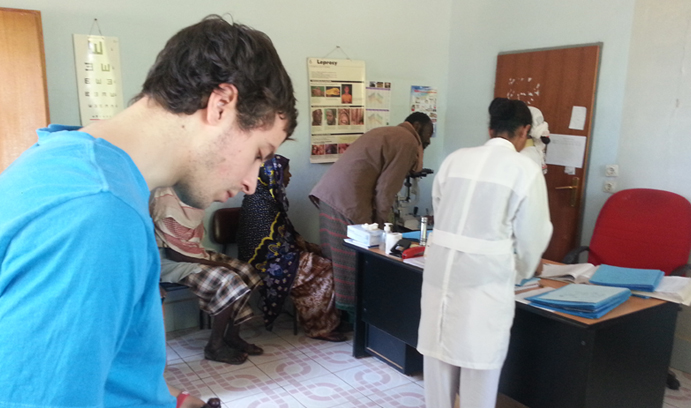Students Study Cataract Surgery in Ethiopia
“It’s crazy to think that people spend much of their lives in blindness just because they can’t afford—or don’t have access to—one of the world’s least expensive surgeries.”
It’s been two months since Jake Puzycki ’14 visited his last surgery room in Harar, Ethiopia. In that time, dozens—if not hundreds—of Ethiopian poor will have had to forgo cataract surgery simply because of materials shortages and a lack of healthcare resources. They are being condemned to a life of darkness.
Along with Kyle Lum ’15, Puzycki traveled to Ethiopia to study the intersection of healthcare and poverty. Their trip was sponsored by a Lehigh Grant for Experiential Learning in Health.
Both students left frustrated that more isn’t being done—but hopeful that, with more attention, the medical needs of the most vulnerable might still be addressed.
They know it may take years for that to happen—and that’s too long for some of the country’s most vulnerable patients. Lum and Puzycki speak of a clinic visit they witnessed by a two-year old girl near Harar. She had what resembled a menacing brown tumor on her eyeball. Doctors explained that a vitamin deficiency was the likely culprit, though it was also possible the girl had developed a cancerous tumor.
As is the case in most other impoverished areas across Ethiopia, the clinic didn’t have the equipment to do a biopsy—and did not have the money to send a sample to Addis Abba for additional testing.
“To make matters worse, if the test came back positive for cancer, the clinic didn't have the equipment or the money to provide chemotherapy, and surgery would expose the child to risk of deadly infection,” Puzycki recalls. “So, with a sort of defeated air, the doctor explained that they were better off just hoping it was a vitamin deficiency and treating it as such.”
For those doctors who wish to serve the country’s poor and vulnerable, their commitment is also a burden. Doctors make the equivalent of about $300 per month. University professors fare worse—as do many of the country’s educated professionals.
Like many developing nations, Ethiopia is straddled with an ineffective government and an infrastructure that makes it very difficult for good surgeons to survive and prosper. In wide-ranging discussions with four practicing surgeons, Puzycki and Lum learned that many doctors worked several jobs, left the country, or entered private practice in order to make ends meet.
“All the educated people—all of the people who could bring about real change—they leave,” says Dr. Mandefro, a surgeon both students shadowed during their trip. “Can you blame them? I cannot.
“It became very obvious to us that the governmental infrastructure surrounding medicine and education in Ethiopia is a large part of the reason people are suffering and feeling stuck,” says Puzycki. “This trip made it very clear to me how complicated an issue poverty is and how many factors come into play.
Posted on:


